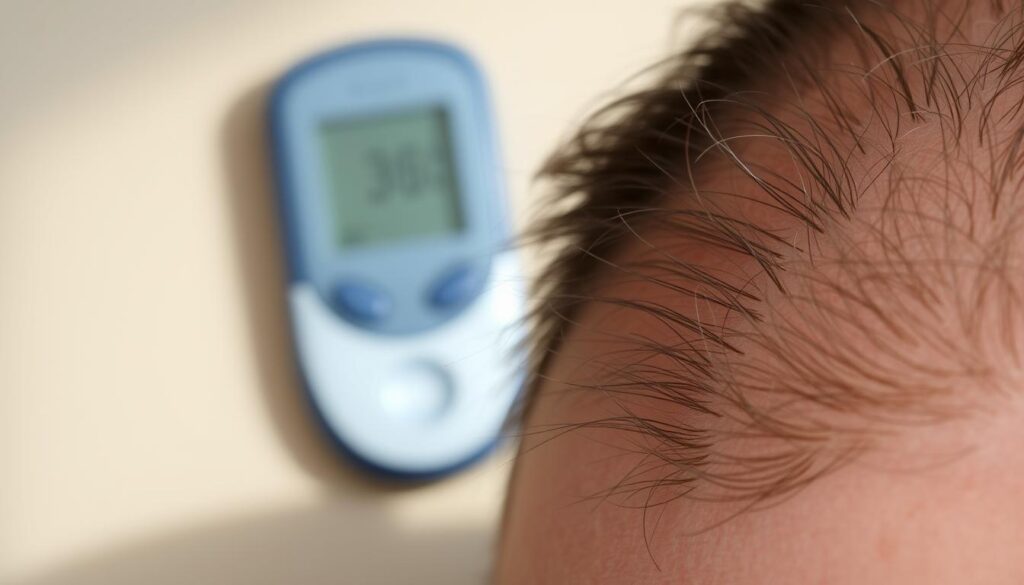Does Diabetes Cause Hair Loss: What You Need to Know

Diabetes affects millions worldwide and can harm many health areas, including hair growth. The link between diabetes and hair loss is important to understand. It helps manage and prevent hair problems.
Diabetes affects hair health by changing how the body makes insulin and handles blood sugar. High blood sugar can harm blood vessels. This reduces the flow of nutrients and oxygen to hair follicles1.
This can slow down hair growth, cause more shedding, and even lead to thinning or loss1.
Both type 1 and type 2 diabetes can cause hair loss. This includes alopecia areata, androgenetic alopecia, and telogen effluvium1. The reasons behind these connections are complex. They involve hormonal imbalances, side effects from medications, and not getting enough nutrients.

Key Takeaways
- Diabetes can impact hair health and lead to increased hair loss or thinning.
- Uncontrolled blood sugar levels can restrict blood flow and oxygen to hair follicles, disrupting the normal hair growth cycle.
- Both type 1 and type 2 diabetes are associated with different types of hair loss, including alopecia areata and androgenetic alopecia.
- Factors like hormonal imbalances, medication side effects, and nutritional deficiencies can contribute to diabetes-related hair loss.
- Effective management of diabetes, including maintaining healthy blood sugar levels and addressing any underlying issues, is crucial for preserving hair health.
Understanding the Link Between Diabetes and Hair Loss
Diabetes, especially Type 2, is a major cause of death worldwide. It affects many health areas, including hair health2. Diabetes can harm hair follicles, change blood sugar levels, and affect the hair growth cycle.
How Diabetes Affects Hair Follicles
High blood sugar in diabetes can damage the small blood vessels. These vessels carry oxygen and nutrients to hair follicles3. This damage can make hair thinner, more fragile, and grow slower2. Also, hair follicles may show signs of damage from high blood sugar before diabetes is diagnosed2.
The Role of Blood Sugar in Hair Health
High blood sugar, common in diabetes, can mess up the hair growth cycle. This cycle has four phases: growth, transition, resting, and shedding3. Diabetes can slow down hair growth, cause more shedding, and stop new hair from growing. This leads to hair loss on the scalp, arms, legs, and more3.
Impact on Hair Growth Cycle
Research links insulin resistance to androgenetic alopecia, a common hair loss type, even in those without diabetes2. This shows diabetes’s impact on hair health goes beyond the diagnosed condition. Hair follicles might show signs of metabolic problems early on2.
| Key Takeaways |
|---|
| – Diabetes, especially Type 2, can damage the small blood vessels that supply nutrients to hair follicles, leading to thinning, fragility, and decreased hair growth3. |
| – Chronic high blood sugar levels can disrupt the normal hair growth cycle, causing increased shedding and preventing new hair from forming3. |
| – There is an association between insulin resistance and androgenetic alopecia, even in non-diabetic individuals, suggesting the hair follicle may be an early indicator of metabolic disturbances2. |
“The hair follicle may reveal early manifestations of hyperglycemia damage before DM2 or prediabetes diagnosis.”2
Does Diabetes Cause Hair Loss: The Scientific Evidence
Research shows a clear link between diabetes and hair loss. People with Type 1 diabetes often face alopecia areata, a condition causing patchy hair loss2. High blood sugar can damage tissues and reduce blood flow to hair follicles2. Hormonal changes and stress from diabetes also lead to hair loss2. Studies indicate that managing blood sugar can slow or stop hair loss related to diabetes2.
Type 2 Diabetes Mellitus (DM2) is a common disorder worldwide, causing significant health issues2. Changes in blood sugar and insulin sensitivity can start years before a diagnosis2. Even before being diagnosed, hair follicles may show signs of damage from high blood sugar2.
In people with DM2, hair can become thinner, more fragile, and sparse due to vascular issues2. There’s a link between insulin resistance, androgenetic alopecia, and hair loss in DM2 patients2.
| Key Findings | References |
|---|---|
| Diabetes affects more than 4.9 million people in the UK alone, with around 90% having type 2 diabetes. | 4 |
| Type 2 diabetes can lead to hair loss, hair thinning, and decreased hair growth due to damage in blood vessels restricting blood flow. | 4 |
| Individuals with Type 1 diabetes are more likely to suffer from autoimmune disorders such as alopecia areata and autoimmune thyroid disorders. | 4 |
| Insulin resistance in diabetes has been linked to androgenetic alopecia (AGA) in men and women. | 4 |
| Diabetes can cause telogen effluvium, a temporary form of hair loss, due to stress and anxiety. | 4 |
| High blood sugar levels and complications associated with diabetes can have an adverse impact on hair follicles, causing hair thinning. | 5 |
| Insulin resistance, a symptom of diabetes, is known to cause hair loss and slow down hair growth. | 5 |
| Diabetes can create a hostile environment for hair follicles due to poor blood flow, leading to conditions like Telogen Effluvium. | 5 |

The scientific evidence clearly shows diabetes and hair loss are connected. High blood sugar, hormonal imbalances, and vascular issues can cause hair loss in diabetics245. Early treatment and managing diabetes are key to preventing hair loss.
Types of Hair Loss Associated with Diabetes
Diabetes can lead to different kinds of hair loss. Diabetic hair loss is common in both type 1 and type 2 diabetes. Knowing about these hair loss types is key to managing them well.
Alopecia Areata and Type 1 Diabetes
Alopecia areata is an autoimmune condition causing patchy hair loss. It’s more common in type 1 diabetes6. In a study, 850 severe hair loss cases were found, with diabetes linked to a 1.68 times higher risk6.
This hair loss happens when the immune system attacks hair follicles. It leads to sudden, unpredictable hair loss in round or oval patches.
Androgenetic Alopecia
Androgenetic alopecia, or pattern baldness, also affects people with diabetes6. Those with diabetes for over 10 years face a 2.05 times higher risk of severe hair loss67. It’s linked to insulin resistance and metabolic syndrome in non-African Americans6.
Telogen Effluvium
Telogen effluvium is stress-induced hair loss seen in diabetes7. High cortisol levels, common in diabetes, can harm hair follicles. This leads to hair growth disorders like androgenetic alopecia and telogen effluvium7.
This hair loss is marked by a sudden increase in hairs entering the resting phase. It results in excessive shedding.
It’s vital to understand these hair loss types linked to diabetes. This knowledge helps in finding the right treatment and management strategies. Each type needs a specific approach to address its causes and help those with diabetes.

How High Blood Sugar Levels Affect Hair Growth
High blood sugar, common in diabetes, harms hair growth and health8. It damages hair tissues and cuts off blood flow to follicles, causing loss and thinning8. Diabetes also brings physical and mental stress, making hair growth harder8.
Diabetes messes with the hair growth cycle8. High sugar slows down hair growth, making it shed and fall out early8. It can also start an autoimmune attack on hair follicles, leading to patchy loss9.
To fight diabetes’s hair effects, keep blood sugar in check with diet, exercise, and meds8. Treatments like PRP, Dermaroller, and Low-Level Laser Light can help8. By tackling metabolic and autoimmune issues, people with diabetes can stop and even reverse hair loss1.
| Impact of High Blood Sugar on Hair | Strategies to Manage Diabetic Hair Loss |
|---|---|
| Damage to hair tissues and follicles Restricted blood flow to hair follicles Disruption of the hair growth cycle Triggering of autoimmune response (alopecia areata) | Maintain healthy blood sugar levels through diet, exercise, and medication Utilize therapies like PRP, Dermaroller, and Low-Level Laser Light Address underlying metabolic and autoimmune factors Ensure adequate hydration and nutrient intake Reduce stress levels through lifestyle changes |

In summary, diabetes’s high blood sugar can really hurt hair growth and cause loss. Knowing how diabetes affects hair and using the right management can help keep hair healthy and strong891.
The Connection Between Diabetes Medications and Hair Loss
Diabetes medications help control blood sugar but can cause hair loss10. Metformin, a common drug, is especially linked to hair loss10. Several factors contribute to this connection.
Common Medications That May Trigger Hair Loss
Metformin can lead to hair loss by blocking vitamin B-12 absorption10. This vitamin is key for hair health10. Other drugs, like sitagliptin, can also cause hair loss in some cases11.
Managing Medication-Related Hair Loss
There are ways to manage hair loss from diabetes drugs11. Changing medication doses or switching treatments can help11. Fixing nutritional gaps, like vitamin B-12, also supports hair growth10.

Working with your doctor is key to balancing diabetes care and hair health11. By tackling the root causes and exploring new treatments, you can manage your hair and diabetes12.
| Medication | Potential Impact on Hair | Mitigation Strategies |
|---|---|---|
| Metformin | Can lead to vitamin B-12 deficiency, contributing to hair loss1011 | Adjust dosage, supplement with B-12, address nutritional deficiencies1011 |
| Sitagliptin | Rare cases of sudden hair loss reported11 | Switch to alternative medication, address underlying causes11 |
| Janumet | Very rare cases of extreme hair loss reported12 | Consult healthcare provider, explore alternative treatments12 |
Knowing how diabetes drugs affect hair can help you manage your condition better12. Talking to your doctor and taking a holistic approach to diabetes care can reduce hair loss risks121011.
Nutritional Deficiencies in Diabetics That Contribute to Hair Loss
Diabetes can cause hair loss due to nutritional deficiencies. Biotin (vitamin B7) deficiency is common in diabetics and affects hair health13. Other nutrients like iron, zinc, and vitamins A, C, and D are also impacted by diabetes13.
Eating a balanced diet with these nutrients can fight hair loss in diabetics14. Foods rich in biotin, such as eggs, oats, and sweet potatoes, can strengthen hair14. Keeping blood sugar levels in check is also key for nutrient absorption13.
Interestingly, diabetes may be one of many causes of hair loss. Genetics, family history, cancer treatment, and health conditions also play a role15. Diabetics should talk to their doctors to find the cause of hair loss and get a treatment plan14.
By tackling nutritional deficiencies and living healthily, diabetics can protect their hair and reduce the risk of hair loss14.
| Nutrient | Importance for Hair Health | Food Sources |
|---|---|---|
| Biotin (Vitamin B7) | Promotes hair growth and strength | Eggs, oats, sweet potatoes, nuts, and legumes |
| Iron | Supports healthy hair follicles and prevents anemia-related hair loss | Red meat, spinach, lentils, and fortified cereals |
| Zinc | Plays a role in hair growth and maintenance | Oysters, red meat, poultry, and legumes |
| Vitamin A | Promotes healthy oil gland function and hair follicle growth | Sweet potatoes, carrots, leafy greens, and dairy products |
| Vitamin C | Supports collagen production, which is essential for hair growth | Citrus fruits, bell peppers, broccoli, and strawberries |
| Vitamin D | Plays a role in hair follicle cycling and maintenance | Fatty fish, egg yolks, and fortified foods |
By addressing nutritional deficiencies and maintaining a healthy lifestyle, diabetics can take proactive steps to support their hair health and mitigate the risk of diabetes-related hair loss14.
Treatment Options for Diabetic Hair Loss
People with diabetic hair loss have many ways to treat it. They can try medical treatments, natural remedies, or make lifestyle changes3. These methods help fix the hair loss problems caused by diabetes, like blood sugar issues and nutrient gaps.
Medical Treatments
Medical treatments include using minoxidil to wake up hair follicles3. Men might get finasteride to handle hair loss from hormones12. For those with alopecia areata, steroid shots in the scalp can help grow hair back12.
Natural Remedies
Natural remedies focus on fixing nutrient gaps that harm hair. Biotin supplements make hair and nails stronger16. Essential oils or hair masks can also nourish the scalp and encourage hair growth.
Lifestyle Changes
Managing diabetes well is key to keeping hair healthy12. Keeping blood sugar in check, reducing stress, and eating well are important3. Also, gentle hair care, like avoiding harsh styling, helps prevent more damage16.
Combining medical treatments, natural remedies, and lifestyle changes can help reverse diabetic hair loss31612. This way, people can grow healthier, more vibrant hair.
Prevention Strategies for Hair Loss in Diabetics
To stop hair loss in diabetics, we need to do several things. We must keep blood sugar levels in check, handle stress well, and live a healthy lifestyle3. High blood sugar can harm the scalp’s tiny blood vessels. This makes it hard for hair follicles to get the nutrients and oxygen they need3. Stress can also mess up the hair growth cycle, causing more hair to fall out3.
- Regular exercise helps blood flow to the scalp3.
- Eat foods full of nutrients good for hair, like biotin, iron, and zinc16.
- Stay away from harsh hair treatments and use gentle products17.
- Use stress-reducing activities like meditation, yoga, or counseling16.
It’s key to see your healthcare provider often to keep an eye on your diabetes3. By following these steps, people with diabetes can fight hair loss and keep their hair looking great31617.
“Protecting your hair health is an important aspect of managing diabetes. With the right strategies, you can prevent hair loss and maintain a lush, healthy head of hair.”
Managing Blood Sugar to Improve Hair Health
Keeping blood sugar levels in check is key for healthy hair in people with diabetes18. High blood sugar can harm scalp blood vessels, cutting off hair follicle circulation and causing hair loss18. Stabilizing blood sugar can lessen this damage and might even stop or reverse hair loss linked to diabetes.
Improving hair health for diabetics requires a few steps. It’s important to regularly check blood sugar, take medicines as directed, eat right, and stay active18. Stable blood sugar ensures hair follicles get the nutrients and oxygen they need for growth.
For those with diabetes and hair loss, fixing nutritional gaps and treating scalp issues like fungal infections can help19. Getting medical advice and trying treatments like mesotherapy, PRP therapy, or low-level laser therapy might be good for severe cases19.
By focusing on blood sugar control, diabetics can take a big step towards having healthy, strong hair.
“Regrowing hair with diabetes involves eliminating problematic foods and being more active.”18
Adding these strategies to a diabetes management plan can lead to better hair health. It might also lower the chance of hair loss related to diabetes.
When to Consult a Healthcare Provider
If you have diabetes and notice hair loss, see your healthcare provider20. This is key if the hair loss comes with other symptoms or affects your life21. Your doctor can figure out if your hair loss is from diabetes, medication, or something else21.
They’ll suggest the right treatments and changes to your diabetes care21. This can help with your hair loss worries.
People with type 1 diabetes might get alopecia areata, where the immune system harms hair follicles20. Your doctor can tell you what kind of hair loss you have. They’ll give you advice on how to manage it well.
Your doctor might suggest taking biotin, a key nutrient for hair20. They can also talk about how to lower stress and exercise more. These can help with hair loss related to diabetes20.
Working with your doctor, you can make a plan to tackle your hair loss21. This plan will help keep your hair healthy21. Regular check-ups and quick actions can greatly improve your hair health journey.
Dealing with hair loss due to diabetes needs a custom plan21. Your healthcare provider knows best how to help you21. Don’t wait to get their help for managing your hair loss and diabetes care.
Conclusion
Diabetes can lead to hair loss, but managing it well can help. In the UK, about 4.9 million people have diabetes, with 850,000 not knowing they do22. It’s important to understand how diabetes affects hair, know the different types of hair loss, and tackle issues like blood sugar, nutrition, and medication side effects23.
Keeping blood sugar in check, eating right, and staying active are key. These steps help control hair loss in people with diabetes.
22 Managing blood sugar is key to preventing hair loss from diabetes22. Medicines like minoxidil can help hair grow by improving blood flow to follicles. But, they might cause skin irritation22.
Finasteride can help men grow hair but might cause problems like erectile dysfunction22. Hair transplant surgery is an option for some, but it’s important to watch blood sugar closely.
22 Diabetes can cause more than hair loss, like stroke and heart disease22. With the right treatment and lifestyle changes, many can manage and even reverse hair loss. By focusing on does diabetes cause hair loss and managing diabetic hair loss, people with diabetes can improve their hair health.
FAQ
Does diabetes cause hair loss?
Yes, diabetes can lead to hair loss. It affects insulin production and blood sugar levels. This can damage blood vessels and disrupt hair growth.
How does diabetes affect hair follicles?
Diabetes harms the blood vessels that supply hair follicles. High blood sugar disrupts hair growth, causing shedding and preventing new hair.
What is the scientific evidence linking diabetes and hair loss?
Research shows Type 1 diabetes increases alopecia areata risk. Uncontrolled blood sugar damages tissues, reducing blood flow to hair follicles.
What are the types of hair loss associated with diabetes?
Diabetes-related hair loss includes alopecia areata, pattern baldness, and stress-induced hair loss.
How do high blood sugar levels affect hair growth?
High blood sugar damages blood vessels, reducing oxygen and nutrient supply to hair follicles. This impacts the hair growth cycle, leading to thinning and loss.
Can diabetes medications cause hair loss?
Yes, some diabetes medications, like metformin, can cause hair loss. This might be due to preventing vitamin B12 absorption.
What nutritional deficiencies can contribute to hair loss in diabetics?
Diabetics may lack biotin, iron, zinc, and vitamins A, C, and D. These deficiencies can harm hair health and lead to loss.
What are the treatment options for diabetic hair loss?
Treatments include topical and oral medications, and steroid injections. Natural remedies like biotin supplements and a balanced diet are also helpful.
How can diabetics prevent hair loss?
Preventing hair loss involves controlling blood sugar, managing stress, and following a healthy lifestyle. Avoid harsh hair treatments and use gentle products.
When should a diabetic with hair loss see a healthcare provider?
If you have diabetes and notice hair loss, see a healthcare provider. They can find the cause and suggest treatments.
Source Links
- Does diabetes cause hair loss?: Causes and treatment options – https://www.medicalnewstoday.com/articles/323810
- HAIR FOLLICLE CHARACTERISTICS AS EARLY MARKER OF TYPE 2 DIABETES – https://pmc.ncbi.nlm.nih.gov/articles/PMC5073072/
- Does Type 2 Diabetes Cause Hair Loss? – https://healthmatch.io/type-2-diabetes/type-2-diabetes-hair-loss
- Wimpole Hair Transplant Clinic – https://wimpoleclinic.com/blog/does-diabetes-cause-hair-loss/
- Diabetes And Hair Loss: Is There A Connection? – https://skinkraft.com/blogs/articles/diabetes-and-hair-loss
- Association of type 2 diabetes with central-scalp hair loss in a large cohort study of African American women – https://pmc.ncbi.nlm.nih.gov/articles/PMC6831789/
- Is Diabetes Causing You to Lose Your Hair? – https://www.verywellhealth.com/diabetes-hair-loss-5111927
- Can Diabetes Cause Hair Loss? | HairMD Pune – https://www.hairmdindia.com/blog/can-diabetes-cause-hair-loss/
- Hairfall Due To Diabetes? Follow These Tips To Reduce Hair Loss – https://www.ndtv.com/health/hairfall-due-to-diabetes-follow-these-tips-to-reduce-hair-loss-4120195
- Does Metformin Cause Hair Loss? – https://www.healthline.com/health/does-metformin-cause-hair-loss
- Metformin and hair loss: Research, risks, and remedies – https://www.medicalnewstoday.com/articles/323410
- Diabetes and Hair Loss: Causes, Treatment, and More – K Health – https://khealth.com/learn/diabetes/diabetes-hair-loss/
- Does diabetes cause hair loss? – Healthcare Associates of Texas – https://healthcareassociates.com/does-diabetes-cause-hair-loss/
- Do Diabetes Cause Hair Loss – McGowan Family Health & Wellness Center – https://mcgowanfamilyhealthandwellnesscenter.com/do-diabetes-cause-hair-loss/
- Hair loss – Symptoms and causes – https://www.mayoclinic.org/diseases-conditions/hair-loss/symptoms-causes/syc-20372926
- Jesse E Smith, MD, FACS – https://www.jessesmithmd.com/hair-loss-associated-with-ozempic/
- Diabetes and Hair loss: An Underrated Connection – Dr. Nikhil Prabhu’s Blog – Diabetes Care – https://blog.drnikhilprabhu.com/2023/03/21/diabetes-and-hair-loss-connection/
- Can Diabetes Affect Your Hair? – honesthairrestoration – https://honesthairrestoration.com/blog/can-diabetes-affect-your-hair/
- Can Diabetes Make Your Hair Fall Out? Causes and Solutions – https://www.drmalaymehta.com/can-diabetes-make-your-hair-fall-out/
- Can Diabetes Lead to Hair Loss? – https://www.healthline.com/health/does-diabetes-cause-hair-loss
- Does Diabetes Cause Hair Loss? Understanding the Connection and Solutions – https://tristateclinics.org/exploring-the-link-between-diabetes-and-hair-loss-understanding-causes-and-management/
- Does Diabetes Cause Hair Loss? Causes and Treatments – https://www.hairpalace.co.uk/blog/diabetes-hair-loss/
- Can Diabetes Cause Hair Loss? Understanding the Impact on Hair Health – HairFree & HairGrow – https://hairfreehairgrow.com/blog/can-diabetes-cause-hair-loss/




